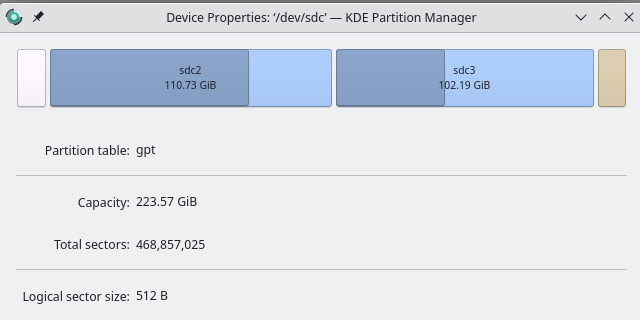EFI requires GPT partition schema.
Legacy or BIOS can work with both but in case of GPT special attention is required.
I guess you are using MBR - which explicitly disables EFI.
And just to remind everyone - Windows is off-topic.
EFI requires GPT partition schema.
Legacy or BIOS can work with both but in case of GPT special attention is required.
I guess you are using MBR - which explicitly disables EFI.
And just to remind everyone - Windows is off-topic.
did the reinstall of grub report errors?
Nope, no errors there
No the partition table is GPT

there is this:
ERROR: mkdir /var/lock/dmraid
but how to fix it, or if it means anything i dont know …
so run just in case these commnad:
mkinitcpio -P
update-grub
I ran
mkinitcpio -P
grub-install --target=x86_64-efi --efi-directory=/boot/efi --bootloader-id=manjaro --recheck --debug
update-grub
in that order and the error disappeared, but I still can’t see grub in the BIOS menu.
this looks lie souped up system, were you using reFind as well
did experiment with raid setup?
Your devices perhaps got raid partition type guid and therefore the system thinks it is raid?
Why do you think this is significant?
I don’t know what raid is, but everything I did is described in the first post.
That is the way one selects which bootloader to use, no ?
So if I can select grub, I should be able to boot into grub.
the mkinit command should be run after you reinstalled grub not before…
so if you start your pc into what os does it boot?
also you said that you installed windows and windows worked normally, so did you disabled fastboot in windows?
When I boot now it boots into refind, there I can currently select Windows and the live-usb.
Fastboot is disabled in the BIOS.
did you run again the mkinit command after you reinstalled it the second time?
post also:
blkid
cat /etc/fstab/
I think this is your issue - the partition is flagged as legacy_boot - if you load up cgdisk for /dev/sdc you will find the partition type guid to be ef02 - where it should be ef00
Ah, I see. How exactly do I remove this flag ?
so I did sudo cgdisk /dev/sdc and selected the ESP partition, it says Current type is ef00.
Delete the partition and recreate it.
The rerun the commands to install grub efi as described earlier.
Yes, I did, but no change.
blkid
/dev/loop1: TYPE="squashfs"
/dev/sdd1: BLOCK_SIZE="512" UUID="0E8A16C30E8A16C3" TYPE="ntfs" PARTUUID="0e8a03b4-01"
/dev/sdb2: UUID="e4819263-1437-47cb-8afa-8e9230eb7a8d" BLOCK_SIZE="4096" TYPE="ext4" PARTUUID="ba2cac38-02"
/dev/sdb3: UUID="6697a587-6eda-4f18-88a9-1ba83fc20b33" TYPE="swap" PARTUUID="ba2cac38-03"
/dev/sdb1: LABEL="Hauptplatte" BLOCK_SIZE="512" UUID="01D3C542C44B29D0" TYPE="ntfs" PARTUUID="ba2cac38-01"
/dev/loop2: TYPE="squashfs"
/dev/loop0: TYPE="squashfs"
/dev/mapper/ventoy: BLOCK_SIZE="2048" UUID="2022-07-21-09-20-14-00" LABEL="MANJARO_KDE_2135" TYPE="iso9660" PTTYPE="dos"
/dev/sde2: SEC_TYPE="msdos" LABEL_FATBOOT="VTOYEFI" LABEL="VTOYEFI" UUID="66F6-D57E" BLOCK_SIZE="512" TYPE="vfat" PARTUUID="b7bffb6a-02"
/dev/sde1: LABEL="Ventoy" UUID="F508-B40B" BLOCK_SIZE="512" TYPE="exfat" PTTYPE="dos" PARTUUID="b7bffb6a-01"
/dev/sdc2: UUID="911149de-2563-4198-89df-8d3832fd2b05" BLOCK_SIZE="4096" TYPE="ext4" PARTUUID="1e53093d-1d33-a64b-837a-c72603987844"
/dev/sdc3: UUID="63b20c95-fc92-475f-b8b6-18fa6880d5c8" BLOCK_SIZE="4096" TYPE="ext4" PARTUUID="08f1477f-c672-0246-b5b5-d6cbcd45c36d"
/dev/sdc1: UUID="3A10-AD17" BLOCK_SIZE="512" TYPE="vfat" PARTUUID="3350d68a-a33f-3e4b-9eb9-4d75647015d7"
/dev/sda4: BLOCK_SIZE="512" UUID="721437E81437AE4B" TYPE="ntfs" PARTUUID="20f5f276-d59d-4910-906d-fad4d7c5aabe"
/dev/sda3: BLOCK_SIZE="512" UUID="18D45014D44FF314" TYPE="ntfs" PARTLABEL="Basic data partition" PARTUUID="fc0e68ba-83fe-489c-8b07-c56d9ed0b20c"
/dev/sda1: UUID="4C3C-6793" BLOCK_SIZE="512" TYPE="vfat" PARTLABEL="EFI system partition" PARTUUID="369bdc03-e19a-4890-8630-e7a6a68e696e"
/dev/loop3: TYPE="squashfs"
/dev/sda2: PARTLABEL="Microsoft reserved partition" PARTUUID="43879069-e29b-4733-b2e0-05e9fa8844c5"
cat /etc/fstab
# /etc/fstab: static file system information.
#
# Use 'blkid' to print the universally unique identifier for a device; this may
# be used with UUID= as a more robust way to name devices that works even if
# disks are added and removed. See fstab(5).
#
# <file system> <mount point> <type> <options> <dump> <pass>
UUID=6697a587-6eda-4f18-88a9-1ba83fc20b33 swap swap defaults,noatime 0 2
UUID=911149de-2563-4198-89df-8d3832fd2b05 /home ext4 defaults,noatime 0 2
UUID=63b20c95-fc92-475f-b8b6-18fa6880d5c8 / ext4 defaults,noatime 0 1
tmpfs /tmp tmpfs defaults,noatime,mode=1777 0 0
UUID=3350D68A-A33F-3E4B-9EB9-4D75647015D7 /boot/efi vfat defaults,noatime 0 2
The reference in fstab should be using the UUID not PARTUUID
I think you have tried so many things you are running in circles trying to fix the fix you applied trying to fix …
Your best bet is to zap the sdc device - then start over - because you are having weird partitions flags - your system thinks it’s a raid device and want to use mdraid
This command removes all traces of signatures and backup partition blocks and what not.
sudo sgdisk --zap-all /dev/sdc
This command will fill the first gigabyte of the device with null
sudo dd if=/dev/null of=/dev/sdc bs=10M count=1000 status=progress
Then you can launch the installer and get a clean install to your sdc device
Omg, this real did the trick. Thank you @all for your help !
Ah yes, that sounds like something I would do ![]()
I will do this when I have some spare time, since if I understand correctly I need to reinstall everything again. Right now I need the system back.
Still thank you for your help ![]()
This topic was automatically closed 2 days after the last reply. New replies are no longer allowed.